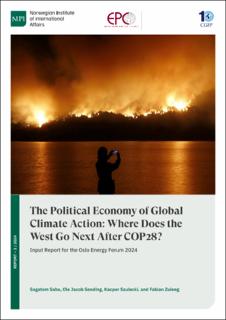| dc.contributor.author | Sending, Ole Jacob | |
| dc.contributor.author | Szulecki, Kacper | |
| dc.contributor.author | Saha, Sagatom | |
| dc.contributor.author | Zuleeg, Fabian | |
| dc.date.accessioned | 2024-02-22T12:00:12Z | |
| dc.date.available | 2024-02-22T12:00:12Z | |
| dc.date.created | 2024-02-20T11:38:34Z | |
| dc.date.issued | 2024 | |
| dc.identifier.issn | 1894-650X | |
| dc.identifier.uri | https://hdl.handle.net/11250/3119323 | |
| dc.description | This is an independent report commissioned by the Oslo Energy Forum (OEF). The authors would like
to thank Reidar Gjærum and Sven Mollekleiv at the OEF for excellent comments on earlier drafts, and
in particular Ulf Sverdrup for getting the project started and for discussions of the issues covered by
this report throughout the duration of the project. | en_US |
| dc.description.abstract | This report offers a critical, candid examination of the landscape of global climate action. Current efforts are lacking even amid consecutive UN climate conferences that build upon the successes of the 2015 Paris Agreement. It argues that the incremental progress achieved thus far is insufficient to address the escalating climate crisis. Challenges of domestic political economy and lacking global governance are substantively at fault. We identify several related barriers to effective climate action, including mismatched time horizons, shared public and private responsibility, the complexity of global challenges, and problems of global collective action and burden distribution. The report explores the distributional costs of climate policies, emphasizing the impacts of populism on climate action (and vice versa), and the need for a fair transition. Global governance challenges are attributable to the limits of existing multilateral institutions and the persistently difficult geopolitical and macroeconomic outlook. We conclude by offering a set of specific policy recommendations, spanning corporate taxation, public investment, long-term commitment mechanisms, the climate action-energy security interface, corporate responsibility, and the imperative of a just, equitable, and participatory transition. The proposed strategies can contribute to achieving time-consistent, decisive and systemic action that tackles the urgent climate crisis, building on political incentives and disincentives. This systematic lens – focused on political economy and global governance constraints - needs to be applied to all climate action policies to get ahead of the curve in the global and domestic political environment in which we find ourselves. | en_US |
| dc.description.abstract | The Political Economy of Global Climate Action: Where Does the West Go Next After COP28? | en_US |
| dc.language.iso | eng | en_US |
| dc.publisher | Norwegian Institute of International Affairs | en_US |
| dc.relation.ispartof | NUPI Report | |
| dc.relation.ispartofseries | NUPI Report;2024-03 | |
| dc.rights | Navngivelse-Ikkekommersiell-DelPåSammeVilkår 4.0 Internasjonal | * |
| dc.rights.uri | http://creativecommons.org/licenses/by-nc-sa/4.0/deed.no | * |
| dc.title | The Political Economy of Global Climate Action: Where Does the West Go Next After COP28? | en_US |
| dc.title.alternative | The Political Economy of Global Climate Action: Where Does the West Go Next After COP28? | en_US |
| dc.type | Research report | en_US |
| dc.description.version | publishedVersion | en_US |
| dc.source.pagenumber | 24 | en_US |
| dc.source.volume | 2024 | en_US |
| dc.source.issue | 3 | en_US |
| dc.identifier.cristin | 2247970 | |
| cristin.ispublished | true | |
| cristin.fulltext | original | |

